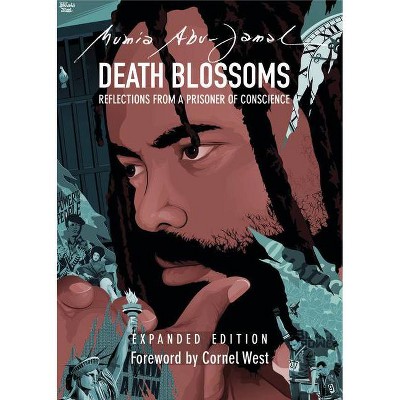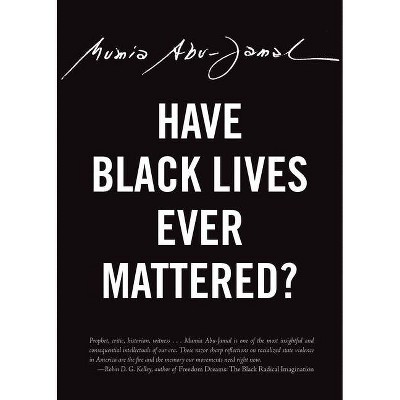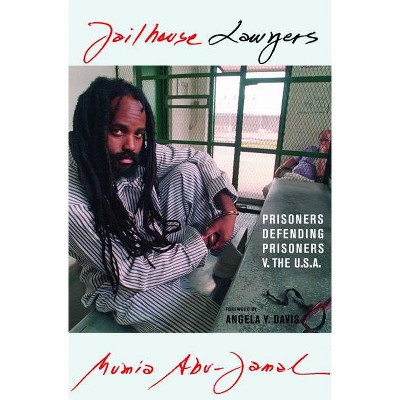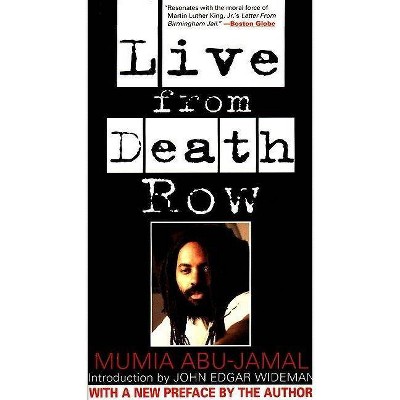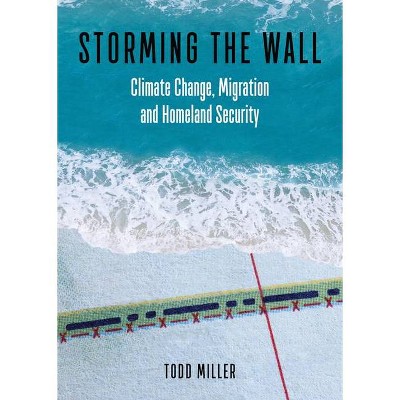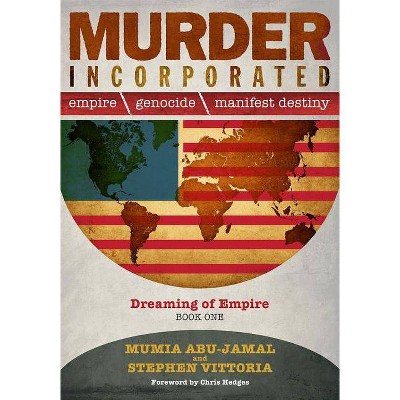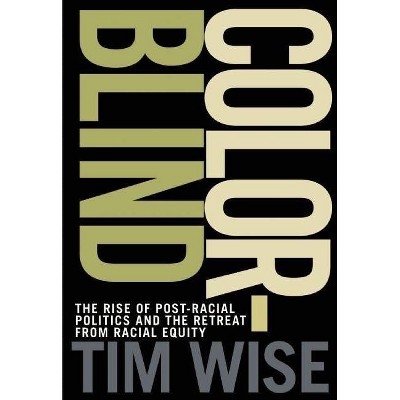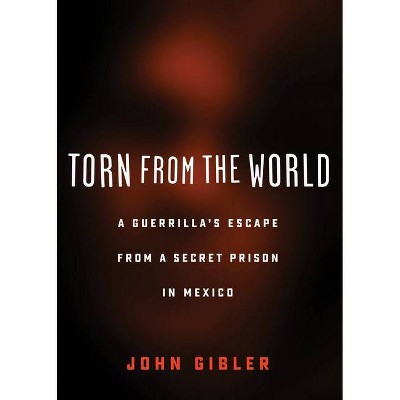Writing on the Wall - (City Lights Open Media) by Mumia Abu Jamal (Paperback)
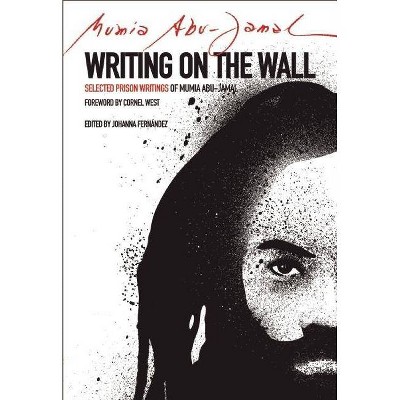
Similar Products
Products of same category from the store
AllProduct info
<p/><br></br><p><b> About the Book </b></p></br></br>Mumia Abu-Jamal's essential perspectives on black experience, race relations, freedom, justice, social change, and the future of American society.<br><p/><br></br><p><b> Book Synopsis </b></p></br></br><p>Revolutionary love, revolutionary memory and revolutionary analysis are at work in every page written by Mumia Abu-Jamal ... His writings are a wake-up call. He is a voice from our prophetic tradition, speaking to us here, now, lovingly, urgently. Black man, old-school jazz man, freedom fighter, revolutionary--his presence, his voice, his words are the writing on the wall.--<b>Cornel West</b>, from the foreword</p><p>From the first slave writings to contemporary hip hop, the canon of African American literature offers a powerful counter-narrative to dominant notions of American culture, history and politics. Resonant with voices of prophecy and resistance, the African American literary tradition runs deep with emancipatory currents that have had an indelible impact on the United States and the world. Mumia Abu-Jamal has been one of our most important contributors to this canon for decades, writing from the confines of the U.S. prison system to give voice to those most silenced by chronic racism, impoverishment and injustice.</p><p><i>Writing on the Wall</i> is a selection of more than 100 previously unpublished essays that deliver Mumia Abu-Jamal's essential perspectives on community, politics, power, and the possibilities of social change in the United States. From Rosa Parks to Edward Snowden, from the Trail of Tears to Ferguson, Missouri, Abu-Jamal addresses a sweeping range of contemporary and historical issues. Written mostly during his years of solitary confinement on Death Row, these essays are a testament to Abu-Jamal's often prescient insight, and his revolutionary perspective brims with hope, encouragement and profound faith in the possibility of redemption.</p><p>Greatness meets us in this book, and not just in Mumia's personal courage and character. It's in the writing. This is art with political power, challenging institutional injustice in the U.S. while catalyzing our understanding, memory and solidarities for liberation and love. <i>Writing on the Wall</i> can set the nation aflame--yes, for creating new possible worlds.--<b>Mark Lewis Taylor</b>, Professor of Theology and Culture, Princeton Theological Seminary</p><p><b>Mumia Abu-Jamal</b> is an award-winning journalist and author of two best-selling books, <i>Live From Death Row</i> and <i>Death Blossoms</i>.</p><p><b>Johanna Fernández</b> is a Fulbright Scholar and Professor of History at Baruch College in New York City.</p><p><b>Cornel West</b> is a scholar, philosopher, activist and author of over a dozen books including his bestseller, Race Matters. He appears frequently in the media, and has appeared on <i>Real Time with Bill Maher</i>, <i>The Colbert Report</i>, CNN and C-Span as well as <i>Tavis Smiley</i>.</p><p/><br></br><p><b> Review Quotes </b></p></br></br><br><p>When you listen to Mumia Abu-Jamal you hear the echoes of David Walker, Frederick Douglass, W.E.B. Du Bois, Paul Robeson, and the sisters and brothers who kept the faith with struggle, who kept the faith with resistance.--Manning Marable</p><p>Mumia Abu-Jamal is one of the most important public intellectuals of our time ... He offers us new ways of thinking about law, democracy and power. He allows us to reflect up on the fact that transformational possibilities often emerge where we least expect them.--Angela Y. Davis</p><p><i>Writing on the Wall</i>, edited by Johanna Fernández with an electrifying foreword by Cornel West ... is destined to become another classic tome in the canon of Prison Literature.--Noelle Hanrahan</p><p>Abu-Jamal's writing tends to be forceful, outraged, and humorous, but he also engages in the bombastic approaches of another era. Early columns focus on his admiration for the cultish radical group MOVE, notoriously bombed by Philadelphia authorities in 1985 following years of conflict between police and blacks. From his captive perspective, the author offers powerful columns on diverse subjects ranging from the plight of black farmers to the crushing of dissent after 9/11. Some remain all too relevant--e.g., those decrying systemic police brutality as seen in flashpoints from Rodney King to Ferguson or the rise of racial disparities in drug sentencing. Abu-Jamal meditates on central figures in the black political narrative, ranging from Dr. Martin Luther King Jr. to Trayvon Martin. Yet some columns indulge in radical-left gamesmanship, as when he dismisses the salutary effects of the landmark Brown v. Board of Education ruling: 'Let the bourgeoisie and the Black middle class celebrate Brown. Meanwhile, let the rest of us ignore it.' As a collection that spans from 1982 to 2014, these topical essays testify to the effects of incarceration on mind and spirit. While his prose has sharpened over time, Abu-Jamal remains enraged and pessimistic about an America that, in his view, remains wholly corrupt: '[Blacks] know from bitter experience that while Americans may say one thing, they mean something quite different.'--<i>Kirkus Reviews</i></p><p>Hope and the seeds of revolution can come from the depths of isolation. Writing from his cell on death row, where he was held in solitary confinement for nearly 30 years, Abu-Jamal has long been a loud and clear voice for all who suffer injustice, racism, and poverty. Edited by Fernandez, this selection of 100 previously unpublished essays includes a foreword by Cornel West.--Evan Karp, <i>SF Weekly</i></p><p>"Mumia knows what is happening better from behind bars than do many on the outside, because he has access to books ... Those of us outside of prison have access to books, too, although many seem to forget it. We could all be as well-informed as Mumia. We could all know what's coming next before it hits us in the face. A good place to start would be by reading the Writing on the Wall."--David Swanson, <i>Counterpunch</i></p><p>Abu-Jamal's commentaries, taken together, target the contradictions of the established order, pointing to its corrupt nature versus the natural power of people-fueled resistance ... It remains to be seen in a 2015 world of social media if the masses of 'Black Lives Matter' tweeters will develop the skill, discipline and commitment of their now-elder statesman Abu-Jamal, who wrote in the margins of the society decades before it became cool."--Todd S. Burroughs, <i>Drums in the Global Village</i></p><p>"A comprehensive anthology of Mumia's short prison commentaries from 1982 to the present, which among other things tracks the ignominious history of police sponsored terror from Haitian immigrant Amadou Diallo (whose body NYPD riddled with of 40 bullets) to 92-year-old elderly Kathryn Johnston, shot to death in her Atlanta home by narcotics officers to 12-year-old Tammir Rice to Eric Garner to Freddie Gray and on and on ... "--Robert Birnbaum</p><p>It's not every prisoner, political or otherwise, who has the endurance and temerity, nor the call to testify like Abu-Jamal, from researching the miscarriage of justice in his own case to becoming a self-proclaimed jailhouse lawyer; few have streets in France named for them or public support from figures diverse as Cornel West, Amy Goodman, Alice Walker, Noam Chomsky, Tariq Ali, and Eddie Vedder. It's safe to say, though consigned to prison for life, Abu-Jamal will not be forgotten now or any time soon: His collected prison writings will be appreciated by human rights activists for ages to come, but more importantly they are useful right now, for anyone seeking a light in the darkness of the American night.--Denise Sullivan, <i>Down with Tyranny!</i></p><p>Given the United States' present position at the epicenter of inhumanity, it's not surprising that Mumia's overarching focus would be the belly of the beast and its all-consuming system of racist capitalism. He's especially well-placed to comment on the prison industrial complex, having spent over 33 years in jail--most of that in solitary confinement on death row ... In a 2006 commentary, Mumia poses the question: 'Is it mere coincidence that the most notorious guard at Abu Ghraib worked right here, in the United States; here, in Pennsylvania; here, in SCI-Greene prison, for over six years before exporting his brand of 'corrections' to the poor slobs who met him in Iraq?' The answer: no, because 'the roots of Guantánamo, of Abu Ghraib, of Bagram Air Force Base, of U.S. secret torture chambers operating all around the world, are deep in American life, in its long war against Black life and liberation.'--Bélén Fernández, <i>Warscapes</i></p><p><i>Writing on the Wall will</i> further amplify this important voice for abolition to a new generation of activists -- Despite being imprisoned for decades, Mumia's sensitivity to the struggles developing around him is a hallmark of his writings and a reminder that his voice is paramount in the movements beyond the walls. Mumia often ends his essays with a question--challenging the reader to go further in our various struggles for social justice. The essays in <i>Writing on the Wall</i> aren't simply analysis. They are alive--a powerful call to action to a reader to join the fight for a better world."--<i>Socialist Worker</i></p><p>The publication of <i>Writing on the Wall</i> underscores the failure of the Fraternal Organization of Police and corrupt politicians to silence Mumia Abu-Jamal. In the face of attempts to execute him, smother his voice behind steel walls, slander him in the news media, intimidate supporters, pass laws to try to keep him from speaking out, and most recently, kill him through highly intentional 'medical neglect, ' Mumia simply refuses to shut up. Like many other political prisoners slated to die in their dungeons, he has what his captors will never have: spiritual strength, dignity, integrity, love for the people, a commitment to revolution--and the ability to read the handwriting on the wall. His message carries the insights of his own generation of Black revolutionaries combined with truths born in struggles in many parts of the world. The time is right. As emerging movements gain strength, vision, and breadth, Mumia finds, in this book a new channel for sharing his ideas with people eager to bring down walls.--Carolina Saldaña, CounterCurrents.org</p><p>Mumia's commentary in <i>Writing on the Wall</i> reflects both the personal ideological journey of a political prisoner and the development of his revolutionary praxis behind prison walls. As editor, Johanna Fernández represents the best of such revolutionary praxis from the outside. Her work to free Mumia and build a revolutionary movement in the US capable of bringing a transition of power from the oppressor to the oppressed should be emulated by all who see themselves as part of a radical movement. Purchase <i>Writing on the Wall</i>. Spread Mumia's revolutionary message far and wide as we work to free him and all political prisoners.--Danny Haiphong, <i>Black Agenda Report</i></p><br><p/><br></br><p><b> About the Author </b></p></br></br><br>MUMIA ABU-JAMAL is an award-winning journalist and author of two best-selling books, <i>Live From Death Row</i> and <i>Death Blossoms</i>, which address prison life from a critical and spiritual perspective. In 1981 he was elected president of the Association of Black Journalists (Philadelphia chapter). That same year he was arrested for allegedly killing a white police officer in Philadelphia. He was convicted and sentenced to death in 1982, in a process that has been described as an epic miscarriage of justice. After spending more than 28 years on death row, in 2011 his death sentence was vacated when the Supreme Court allowed to stand the decisions of four federal judges who had earlier declared his death sentence unconstitutional. He is now serving a life sentence without the possibility of parole. In spite of his three-decade-long imprisonment, most of which was spent in solitary confinement on Death Row, Abu-Jamal has relentlessly fought for his freedom and for his profession. From prison he has written seven books and thousands of radio commentaries. He holds a BA from Goddard College and an MA from California State University, Dominguez Hills. His books have sold more than 100,000 copies and have been translated into seven languages. <p/>JOHANNA FERNÁNDEZ is a former Fulbright Scholar to Jordan and Assistant Professor of History at Baruch College of the City University of New York where she teaches 20th Century US history and African American History. She is author of the forthcoming <i>When the World Was Their Stage: A History of the Young Lords Party, 1968-1976</i> (Princeton University Press). Fernandez is the writer and producer of the film, <i>Justice on Trial: the Case of Mumia Abu-Jamal</i> and she is featured in the critically acclaimed documentary about Mumia Abu-Jamal, <i>Long Distance Revolutionary</i>. Her writings have been published internationally, from <i>Al Jazeera</i> to the <i>Huffington Post</i>. She gives interviews often and has appeared in a diverse range of print, radio, online and televised media including <i>Democracy Now!</i> with Amy Goodman, the Fox News shows <i>Hannity</i> and <i>Megyn Kelley, Al Jazeera</i> and <i>The New York Times</i>. She is a coordinator of the Campaign to Bring Mumia Home. <p/>CORNEL WEST is a scholar, philosopher, activist and author of over a dozen books including his bestseller, <i>Race Matters</i>. He appears frequently in the media, and has appeared on the <i>Bill Maher Show</i>, <i>Colbert Report</i>, CNN and C-Span as well as on Tavis Smiley's PBS TV Show.
Price History
Cheapest price in the interval: 14.99 on October 22, 2021
Most expensive price in the interval: 14.99 on November 8, 2021
Price Archive shows prices from various stores, lets you see history and find the cheapest. There is no actual sale on the website. For all support, inquiry and suggestion messagescommunication@pricearchive.us
